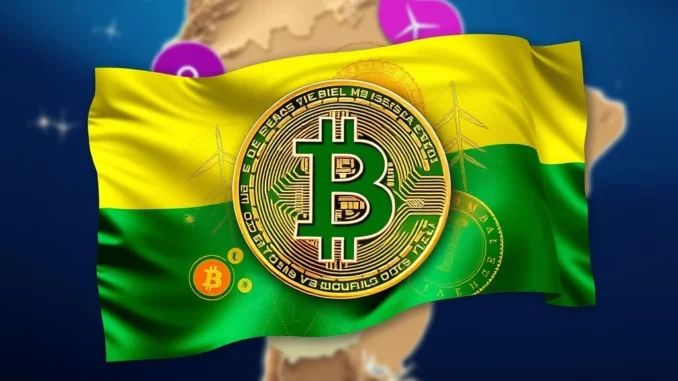
In a fascinating turn of events, Bolivia is making headlines by embracing cryptocurrency to tackle a pressing economic challenge. Facing a significant U.S. dollar shortage, the nation’s state-owned energy giant, Yacimientos Petrolíferos Fiscales Bolivianos (YPFB), is reportedly set to utilize digital currencies for its energy import transactions. This bold decision, as reported by CoinDesk citing Reuters, signals a potentially groundbreaking shift in how countries navigate financial constraints in the modern era. Let’s dive deep into what this means for Bolivia, South America, and the wider world of cryptocurrency.
Navigating the Dollar Shortage with Cryptocurrency
Bolivia, like many nations, is grappling with economic headwinds. A key factor contributing to their current situation is a decline in natural gas exports, a crucial revenue source for the country. This downturn has triggered a fuel crisis and sparked public unrest, putting pressure on the government to find innovative solutions. The U.S. dollar shortage further complicates matters, making international transactions, particularly for essential imports like energy, increasingly difficult.
Enter cryptocurrency. In a move that underscores the decentralized financial system’s potential, YPFB is turning to digital assets to bypass the limitations imposed by the dollar shortage. This isn’t just a quick fix; it’s a strategic pivot that could redefine how Bolivia conducts international trade. But why cryptocurrency? Let’s break down the advantages:
- Bypassing Dollar Dependency: Cryptocurrency transactions operate outside the traditional banking system and don’t necessarily require the U.S. dollar as an intermediary. This is a game-changer for a nation facing dollar scarcity.
- Faster Transactions: Crypto transactions can be significantly faster than traditional international banking, which often involves multiple intermediaries and lengthy processing times. Speed is crucial when securing vital energy supplies.
- Potentially Lower Fees: Depending on the cryptocurrency and exchange used, transaction fees can be lower than those associated with traditional banking, especially for international transfers.
- Increased Autonomy: Embracing cryptocurrency provides Bolivia with greater financial autonomy, reducing its reliance on traditional financial systems and potentially mitigating the impact of international sanctions or financial pressures in the future.
However, it’s important to acknowledge that this is a complex undertaking. Successfully implementing cryptocurrency for energy imports requires careful planning, robust infrastructure, and a clear understanding of the associated risks, including price volatility and regulatory uncertainties.
South America: A Hotbed for Crypto Innovation?
Bolivia isn’t alone in exploring the potential of cryptocurrency in South America. This region is increasingly becoming a focal point for crypto adoption, often driven by economic challenges and a desire for financial innovation. The article rightly points out that Bolivia’s move mirrors similar strategies adopted by other state-owned energy giants in the region.
Consider Argentina’s YPF and Venezuela’s PDVSA. These companies have also turned to cryptocurrency for various financial maneuvers, ranging from circumventing sanctions to facilitating international payments. This trend suggests a broader regional shift, with South American nations exploring digital currencies as tools to navigate economic complexities and enhance financial resilience.
Why is South America so receptive to crypto?
- Economic Instability: Many South American countries have a history of economic instability, including currency devaluation and inflation. Cryptocurrency offers a potential hedge against these issues.
- Dollar Dependence: The region’s reliance on the U.S. dollar for international trade makes them vulnerable to dollar shortages and U.S. financial policies. Crypto provides an alternative.
- Tech-Savvy Population: South America has a young and increasingly tech-savvy population, which is more open to adopting new technologies like cryptocurrency.
- Desire for Financial Inclusion: Cryptocurrency can offer financial services to underbanked populations, a significant demographic in many South American nations.
Energy Imports Reimagined: A New Era for Bolivia?
Bolivia’s decision to use cryptocurrency for energy imports is not just about addressing a dollar shortage; it’s about strategically rethinking how the nation engages in international trade. By embracing digital currencies, Bolivia is potentially positioning itself at the forefront of a new era of global commerce, one where digital assets play a more prominent role in facilitating international transactions.
What are the potential benefits for Bolivia in the long run?
- Reduced Transaction Costs: Over time, streamlined crypto transactions could lead to significant cost savings in international trade.
- Enhanced Trade Relationships: Adopting crypto could open up new trading partnerships with nations that are also crypto-friendly, diversifying Bolivia’s economic relationships.
- Boost to Digital Economy: This move could spur the growth of Bolivia’s digital economy, attracting investment and fostering innovation in the fintech sector.
- Improved Financial Resilience: By diversifying its financial tools and reducing dollar dependence, Bolivia can build a more resilient economy, better equipped to weather future economic shocks.
Challenges and Considerations
While the potential benefits are substantial, it’s crucial to acknowledge the challenges and risks associated with this pioneering move. Adopting cryptocurrency for national-level transactions is not without its hurdles.
Key challenges to consider:
| Challenge | Description |
|---|---|
| Volatility: | Cryptocurrency prices are notoriously volatile. Fluctuations in value could impact the cost of energy imports and require sophisticated risk management strategies. |
| Regulatory Uncertainty: | The regulatory landscape for cryptocurrency is still evolving globally. Bolivia needs to navigate potential regulatory changes and ensure compliance. |
| Infrastructure and Expertise: | Implementing crypto transactions requires robust digital infrastructure and skilled personnel. Bolivia needs to invest in these areas. |
| Security Risks: | Cryptocurrency transactions, while secure, are not immune to security breaches. Robust security protocols are essential to protect against theft and fraud. |
| Adoption and Education: | Widespread adoption of crypto within government and businesses requires education and training to ensure smooth implementation and usage. |
Actionable Insights: What Can We Learn?
Bolivia’s decision to embrace cryptocurrency for energy imports offers valuable lessons for other nations and businesses. It highlights the potential of digital currencies to address real-world economic challenges and foster financial innovation.
Key takeaways:
- Crypto as a Solution for Dollar Shortages: For countries facing dollar scarcity or seeking to reduce dollar dependence, cryptocurrency presents a viable alternative for international trade.
- Innovation in State-Owned Enterprises: Bolivia’s YPFB demonstrates that state-owned enterprises can be drivers of innovation, adopting cutting-edge technologies to overcome economic hurdles.
- South America as a Crypto Hub: The trend in South America suggests that this region could emerge as a leading hub for cryptocurrency adoption and innovation.
- Strategic Diversification: Embracing cryptocurrency is a form of strategic financial diversification, reducing reliance on traditional systems and enhancing economic resilience.
Conclusion: A Revolutionary Step Forward?
Bolivia’s move to utilize cryptocurrency for energy imports is undoubtedly a bold and potentially revolutionary step. It’s a testament to the power of innovation in the face of economic adversity and underscores the growing importance of cryptocurrency in the global financial landscape. While challenges remain, this decision could pave the way for a more decentralized, efficient, and resilient global trade system, especially for nations seeking alternatives to traditional financial frameworks. As Bolivia embarks on this exciting journey, the world will be watching closely to see if this pioneering approach truly marks a new chapter in international commerce and the adoption of digital currencies.



